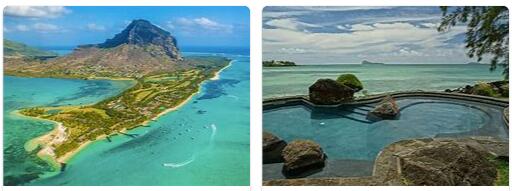Mauritius is a true paradise island where the balance between white sandy beaches, deep blue lagoons, beautiful mountains, Hindu temples, Indian markets and exciting excursions provide perfect conditions for a relaxing and exciting journey. Visit insidewatch.net for versatile Mauritius.
On this page you will find practical information and facts about Mauritius.
PRACTICAL INFORMATION ABOUT TRAVELING IN MAURITIUS
Climate and best travel time
You can travel in Mauritius all year round but the best period is from April to December. Then it is usually wonderfully warm and usually does not rain that much. It can sometimes be a bit chilly in the evenings at this time of year, so we recommend that you bring a sweater or a thin sweater.
June to August is the driest period which is also a bit cooler. During this period it is usually a little cooler on the east coast than on the west coast and it is often windy. From June to August, therefore, visits to the west and southwest coasts are mainly recommended.
January to March is the warmest period. These months are also the wettest with short heavy rains. When the clouds come in from the east, precipitation falls mainly over the central and eastern areas. This is why we primarily recommend the west coast during this period.
January to March is officially the cyclone season, which, after all, rarely happens. In fact, the island is hit by a cyclone only on average every five years.
Our recommendations on when it is best to travel in Mauritius are based on how the climate has been in the previous year. The weather in Mauritius can be very changeable and unpredictable and therefore our recommendations should only be seen as an indication.
Money
The Mauritian currency is called the rupee (MUR). In Mauritius, Visa cards can be used in most hotels, shops and supermarkets. In addition, ATMs are common in cities. However, it is always a good idea to have euros in cash as a reserve.
Visa
conditions NOTE! Visa rules are subject to change at short notice, so we recommend that you check the current conditions at the country’s embassy or at The Ministry of Foreign Affairs’ website. The following information may change.
Swedish citizens can stay for 90 days without a visa in Mauritius upon entry. Please note that your passport must be valid for at least six months after departure. Please note that all children of all ages must present their own passport upon entry into Mauritius.
Transport
Please note that in Mauritius you drive on the left side of the road.
Bus
It is possible to travel around the whole island with local buses. It is relatively cheap to travel around this way and you can reach almost any place on the island. Most often, however, it is necessary to change buses sometimes to reach the whole country.
Taxi
You can find taxis everywhere. They can be used for shorter trips, but also across the island or for full day sightseeing. Taximeters are not used so it is important to agree on the price in advance. Taxis waiting outside the hotels expect a higher price than normal.
Car
It is easy to rent a car and drive around the country yourself. It is possible to rent cars in different classes and prices. We recommend that you check whether your travel insurance applies to rental cars, as you can not be sure whether, for example, hull and liability insurance is included.
Tip
In most countries, tips are part of the salaries of employees in the service industry. Therefore, it is good practice (and sometimes directly necessary) to give tips to, for example, cleaning staff, waiters, guides, drivers, etc. depending on the country you are visiting. Therefore, we recommend that you familiarize yourself with how much is normally given in tips and to whom before you embark on your journey. Find information on tips in Lonely Planet’s guidebooks.
FACTS
CAPITAL: PORT LOUIS
LANGUAGE: ENGLISH, FRENCH AND CREOLE
CLIMATE: TROPICAL
CURRENCY: MAURITIAN RUPEES
RELIGION: HINDUS, CHRISTIANS AND MUSLIMS
INFORMATION MAURITIUS
Mauritius is located east of Madagascar in the Indian Ocean. Despite their isolated location, the population shows incredible diversity. The inhabitants of Mauritius are mainly descendants of slaves who came to the country during the French, British and Dutch colonization, but also Africans, Indians and Chinese have found their way to this little paradise. The colonial era has left behind colorful, well-preserved buildings and the lively cultural mix has spread to both the language and the Mauritian cuisine.
